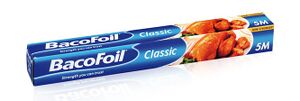
Although called Tinfoil (tin-foil, tin foil or baking foil), in culinary terms, tin-foil refers to aluminium foil, which has long since replaced tin foil due to cost and durability.
Common culinary uses:
- Insulation from excess heat such as covering chicken legs when roasting
- Preventing pie crusts from burning by laying foil over the pastry once it has risen
- Use a double layer under a saucepan lid to create a superior seal
- Preserving, by wrapping foodstuffs for freezing and refrigeration
- Preventing the release of steam or moisture
- Creating a make-shift/temporary bain-marie
- Re-invigorating brown sugar - to do this, wrap the block of hardened sugar in some aluminium foil and bake in a 150° C (300° F - gas 2) oven for 5 minutes.
- Wrapping fish, meat or vegetables in a foil parcel when cooking
- Keeping ovens and hobs clean - lay a sheet in the base of the oven.
Depending on your what type of hob you have, it might be possible to also put a layer down (or two sheets overlapping side by side, depending on size/area of device) to protect from spills and stains. Work only on a cold range/cooker. For gas hobs, dismantle rack and then the burners as far as possible (get professional advice if you're not sure about this). Now, for electric hobs as well, lay a sheet (or two) over the top of the whole thing. Then press down to mark the size of the circular apertures you will need to cut out. Do this cutting either with kitchen scissors (first put a hole in the middle of the circle with the tips, then move to the outside) or if you're really brave, with a sharp knife on a chopping board. (Alternatively, find a cup or plate with similar diameter and cut around that - exact size holes are not totally necessary although more desirable.) Lay and align foil sheet in position, fold over at the edges of the hob. Re-assemble gas burners and check for proper/normal operation. After use, or when the foil just becomes unbearable to look at, replace. With a bit of practice, this whole procedure can become quick, easy and second nature. However, some cleaning by hand might occasionally be necessary as sometimes those naughty spills get underneath!!
For obvious reasons, these directions do not apply to ceramic-type hobs - these have to cleaned with a scraper and proprietary cleaning products
Heavy-duty tin foil

The are probably others, but Bacofoil Classic is a really good quality heavy duty tin-foil, almost twice the thickness of some more economical varieties. Worth using for those special recipes!